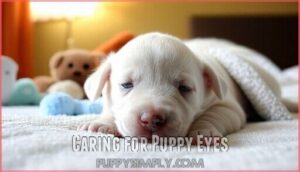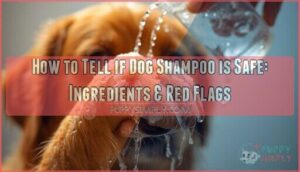This site is supported by our readers. We may earn a commission, at no cost to you, if you purchase through links.
 When do puppies open their eyes? You’ll see those tiny peepers crack open between 10-14 days after birth, marking a significant milestone in your pup’s development.
When do puppies open their eyes? You’ll see those tiny peepers crack open between 10-14 days after birth, marking a significant milestone in your pup’s development.
Smaller breeds typically open their eyes around day 10, while larger breeds may take up to 14 days. Don’t expect perfect vision right away—newborn puppies see the world as a blurry mess, with limited focus beyond a few inches.
Their eyesight gradually sharpens over the following weeks, reaching full clarity by 8 weeks old. Individual puppies in the same litter can vary by a day or two, which is perfectly normal and influenced by genetics and overall development rate.
Understanding what happens next is essential for keeping those precious eyes healthy.
Table Of Contents
- Key Takeaways
- Puppy Eye Development
- When Puppies Open Eyes
- Factors Affecting Eye Opening
- Monitoring Puppy Eye Health
- Caring for Puppy Eyes
- Common Issues and Concerns
- Post-Eye Opening Care
- Frequently Asked Questions (FAQs)
- What week do puppies start to walk and open their eyes?
- What should I do if my puppy’s eyes have not opened after two weeks?
- What are some signs that there may be a problem with a newborn puppy’s eyes?
- At what age can puppies start walking?
- Is it safe to touch newborn puppies?
- Can bright lights damage newborn puppy eyes?
- Do all puppies eyes change color eventually?
- When can puppies see their mother clearly?
- Are tear stains normal in young puppies?
- How does blindness affect puppy development?
- Conclusion
Key Takeaways
- Your puppy’s eyes will open between 10-14 days after birth, with smaller breeds typically opening around day 10 and larger breeds taking up to 14 days.
- Don’t expect clear vision immediately—your pup’s eyesight starts blurry and gradually sharpens over several weeks, reaching full clarity by 8 weeks old.
- Watch for warning signs like discharge, swelling, or redness around sealed eyelids, which could indicate infection requiring immediate veterinary attention.
- Keep newly opened eyes protected from bright lights and maintain dim lighting until your puppy’s vision fully develops and adjusts to their environment.
Puppy Eye Development
When you welcome a new puppy into your home, you’ll notice their eyes remain tightly sealed for the first week or two of life.
This natural development protects their delicate eyes while they continue growing and adjusting to life outside the womb, which is a natural part of their development.
Eyes Closed at Birth
Newborn puppies arrive with their eyes sealed shut, a natural protection during fetal growth.
Their eyelids remain fused for the first week, shielding developing eyes from light and debris.
This puppy development stage prioritizes sensory development through smell and touch.
During newborn puppy care, you’ll notice they navigate entirely through these heightened senses, making eye protection essential for healthy puppy eye development timeline progression.
Initial Vision Limited
When your puppy’s eyes first open, don’t expect crystal-clear puppy vision development just yet.
Your puppy’s first glimpse of the world will be beautifully blurry—and that’s perfectly normal
Their initial sight resembles looking through frosted glass, with limited visual acuity and basic light perception.
Here’s what your puppy experiences during these early puppy eye development stages:
- Light Perception – They detect brightness and shadows but lack vision clarity
- Limited Sight – Objects appear blurry without sharp eye focus
- Movement Detection – They notice motion better than stationary items
- Close-Range Vision – Only see things within a few inches clearly
This puppy vision timeline is completely normal when puppies see for the first time.
Understanding puppy eye care is vital for their overall health and development.
Vision Improvement Timeline
Your puppy’s eye development follows a steady path from darkness to clarity.
Initial light perception begins around 10-14 days, but visual acuity remains fuzzy.
Eye maturation progresses gradually—by three weeks, they’ll detect movement and shapes.
Full vision clarity doesn’t arrive until 8 weeks when eye development completes, transforming your puppy’s world from shadows into sharp focus, and bringing clarity to their vision.
When Puppies Open Eyes
Your puppy’s eyes won’t stay closed forever, though it might feel that way when you’re anxiously waiting to see those adorable peepers! The when do puppies open their eyes milestone typically occurs between 10 to 14 days after birth.
This puppy eye opening process happens gradually, with one eye often opening before the other—completely normal for newborn puppy development. During these early eye opening stages, you’ll notice their vision remains quite limited.
Think of it like looking through frosted glass; they can detect light and movement but can’t focus clearly yet. This puppy eye development timeline reflects nature’s protective design, keeping those delicate eyes safe while they finish developing.
Canine development follows a predictable pattern, and puppy vision continues improving for weeks after initial opening. Here’s what to expect during this exciting puppy development stages period:
- Eyes appear cloudy or milky blue initially
- Vision gradually sharpens over several weeks
- Light sensitivity requires dim environments
- Full clarity develops around 8 weeks
- Individual timing varies within litters
Smart eye care tips start with patience—let nature take its course.
Factors Affecting Eye Opening
While most puppies follow a predictable eye-opening timeline, several factors can influence when your puppy’s eyes actually open.
Breed size, individual genetics, and developmental variations all play a role in determining whether your pup will peek at the world closer to 10 days or wait until 16 days.
Breed and Size Influence
Size matters in the context of puppy eye opening age. Smaller breeds typically open their eyes earlier, around 10 days, while larger breeds may take up to 14 days or more.
Eye genetics play a role in these breed differences, with size factors directly affecting the puppy eye development timeline. Your puppy’s breed variations influence their vision milestones, making breed differences important.
Understanding puppy eye development is essential for identifying potential issues early on, especially considering breed differences and the impact of size factors.
Premature Puppies
Born earlier than expected, premature puppies face unique challenges with eye development and require special attention during their neonatal stage.
These vulnerable newborns often experience delayed puppy eye opening age, sometimes taking several extra days beyond the typical 10-14 day window.
Their infant vision development follows a slower timeline due to incomplete neural pathways, making premature care essential as these special needs pups need gentle handling and close monitoring for puppy eye health issues during early development.
Understanding the evolution of puppy eye care is essential for providing proper support and attention to their vision needs.
Individual Variations
Even within the same litter, you’ll notice fascinating differences in puppy eye development milestones.
Genetic factors play a key role—some pups inherit faster development rates while others follow their own timeline.
Birth order doesn’t substantially impact when do puppies open their eyes, but litter size can influence individual attention from mom.
Eye color changes occur gradually after opening, with most starting blue then shifting to their permanent shade.
These natural variations in puppy eye development timeline are perfectly normal.
Monitoring Puppy Eye Health
Watching your puppy’s eye health closely helps you catch problems early and guarantees proper development.
You’ll want to look for signs of infection like discharge, swelling, or redness that could indicate your little one needs veterinary attention.
Signs of Infection
Looking beyond timing variations, infections present serious risks that demand your immediate attention.
Watch for these warning signs that your puppy’s eyes aren’t developing properly:
- Eye Redness around sealed lids – often your first clue that bacteria have moved in
- Pus Discharge creating yellow or green crusty buildup – this isn’t normal puppy eye discharge
- Eye Swelling making lids appear puffy or inflamed – a clear red flag
- Cloudy Vision once eyes open, showing gray or blue tinting instead of clarity
- Eye Irritation causing excessive pawing, squinting, or obvious puppy eye discomfort
These puppy eye infection symptoms can escalate quickly, potentially causing permanent damage or blindness.
Regular Veterinary Check-Ups
Your puppy’s first vet visit should happen within days of eye opening to establish baseline health.
Schedule regular puppy health checks every 2-3 weeks during early development. Your veterinarian will use specialized eye exam techniques to assess puppy eye development milestones and overall puppy eye health.
These visits catch issues early, and veterinary guidance guarantees proper puppy eye care throughout this critical period, ensuring proper puppy eye care.
Preventing Complications
While proactive eye care tips and infection control measures can’t guarantee perfect vision development, they substantially reduce your puppy’s risk of complications.
Monitor daily for discharge, swelling, or cloudiness—early health monitoring catches problems before they escalate.
Maintain clean surroundings, make certain proper nutrition, and never force eyes open, as puppy eye trauma care requires gentle handling.
Vision protection starts with prevention. Understanding puppy eye development is vital for identifying potential issues and providing proper care, which is a key part of puppy care.
Caring for Puppy Eyes
Once your puppy’s eyes begin opening, proper care becomes essential to protect their delicate developing vision.
You’ll need to gently clean any discharge, provide appropriate lighting, and watch for signs of infection or irritation.
Cleaning Eye Discharge
Once you spot signs of infection, proper eye cleaning techniques become essential for your puppy’s health.
Use boiled, cooled water and gently wipe away discharge with a soft cloth. This gentle wiping prevents crusty buildup around sealed eyes.
Clean from inner to outer corner, using fresh sections of cloth for each eye.
Proper puppy eye hygiene maintenance stops bacteria from spreading and supports healthy eye development. Understanding the evolution of puppy eye care is essential for effective maintenance and infection prevention.
Socialization and Stimulation
Once your puppy’s eyes open, it’s time to gently introduce new sights and sounds.
Start puppy socialization gradually with Environmental Enrichment like different textures and mild noises.
These Puppy Interactions support Sensory Development during the puppy development timeline.
Play Stimulation helps with Social Learning as puppy vision development progresses.
Keep sessions short and sweet—your little one’s still adjusting to this bright new world.
Using the right puppy socialization tools, such as those found in Puppy Socialization, can greatly aid in this process.
Preventive Measures
Smart prevention starts with gentle eye cleaning using cooled boiled water to remove discharge buildup.
Keep your puppy’s environment dimly lit until their sensitive eyes fully adjust. Never force their eyelids open—this can cause permanent damage.
Trim excessive facial hair that might irritate developing eyes. Regular infection control through clean bedding and proper maternal vaccinations creates the foundation for healthy puppy eye opening anticipation and lifelong vision protection.
Additionally, using a proper eye care product is essential for maintaining their eye health and ensuring lifelong vision protection.
Common Issues and Concerns
While most puppies open their eyes right on schedule, you might encounter some bumps along the way that warrant your attention.
Understanding common eye-opening issues helps you distinguish between normal development and situations that need veterinary care.
Delayed Eye Opening
Sometimes you’ll encounter puppies whose eyes remain stubbornly shut past the typical 14-day mark.
This delayed eye opening can stem from various Eye Delay Causes, including congenital issues, premature birth, or nutritional deficiencies affecting pupil development.
- Genetics: Certain breeds like Fox Terriers naturally open eyes around 21 days
- Health factors: Premature birth or systemic issues slow development milestones
- Environmental stress: Poor conditions increase Eye Infection Risk and delays
- Congenital Issues: Fused eyelids may physically prevent normal opening
Puppy owners should be aware of normal puppy eye development to identify potential issues early.
Eye Infections and Irritations
Eye infections and irritations can quickly turn a puppy’s early weeks into a concerning experience.
You’ll notice puppy eye redness, thick eye discharge, or swelling around sealed lids.
Puppy conjunctivitis appears as pink, inflamed tissue, while corneal ulcers create cloudy spots.
Iris inflammation causes sensitivity to light.
Don’t attempt puppy eye discharge cleaning yourself—these puppy eye infections need professional treatment to prevent serious complications.
Congenital Defects
While infections affect healthy puppies, some eye problems stem from birth defects.
Congenital eye defects occur in approximately 0.3% of dogs, with cataracts, microphthalmia, and persistent pupillary membranes being most common.
These genetic disorders can cause vision impairment ranging from mild to severe blindness.
Breeds like Collies and French Bulldogs show higher risks for these developmental issues requiring early veterinary screening.
Post-Eye Opening Care
Once your puppy’s eyes open, you’ll need to create the right environment for their developing vision. This means protecting those sensitive new eyes while supporting their overall growth and learning.
Dim Lighting and Protection
After your puppy’s eyes open, they’ll need careful vision safety protection from bright lights.
Their newly opened eyes are incredibly sensitive, and sudden exposure can cause discomfort or damage.
- Eye Shielding: Keep puppies away from direct sunlight and harsh indoor lighting
- Light Control: Use dim environments with soft, filtered lighting during puppy eye development
- Puppy Comfort: Create cozy spaces that support puppy eye opening milestones without overwhelming their sensitive vision
Motor Development and Coordination
Once your puppy’s eyes adjust to their bright new world, their motor skills start catching up fast.
As puppy vision timeline progresses through eye opening stages, you’ll notice improved paw control and balance skills developing alongside their sight.
Their reflex actions become sharper, muscle tone strengthens, and coordination exercises like gentle play help sync their movements with what they’re seeing during these puppy eye milestones.
Proper puppy socialization techniques are also essential for their overall development and confidence building.
Their development is significantly influenced by proper socialization and motor skills that are refined over time through practice and interaction with their environment.
Nutrition and Training
Feeding your puppy properly supports healthy development during this vital growth phase.
As eyes open and coordination improves, establishing consistent puppy care basics becomes essential for meeting their evolving nutrient needs.
A well-planned puppy diet includes consideration of homemade puppy food recipes to guarantee a balanced intake of nutrients.
- Quality puppy diet: Choose age-appropriate food that fuels rapid puppy development and growth milestones
- Consistent feeding schedule: Regular meals support healthy digestion and energy for exploration
- Training readiness: Proper nutrition enhances focus for early socialization and learning
Frequently Asked Questions (FAQs)
What week do puppies start to walk and open their eyes?
Like ye olde pups from medieval times, your furry friend’s eyes will open around two weeks old, typically between days 10-
They’ll start taking wobbly first steps around the same time.
What should I do if my puppy’s eyes have not opened after two weeks?
Schedule a veterinary consultation immediately if your puppy’s eyes haven’t opened after two weeks.
Delayed opening beyond 14-16 days can signal infections or congenital issues requiring professional treatment.
Don’t attempt opening them yourself, as this can cause further issues, and professional treatment is necessary to address potential problems.
What are some signs that there may be a problem with a newborn puppy’s eyes?
Red flags include swelling, discharge, or crusty buildup around sealed eyes, which may signal infection.
You’ll notice redness, persistent closure beyond 16 days, or one eye opening while the other remains problematic—seek veterinary care immediately.
At what age can puppies start walking?
Most puppies take their first wobbly steps around two to three weeks old, typically between 14 to 21 days after birth.
You’ll notice they’re still quite unsteady at first, gradually gaining coordination and strength over the following weeks, which helps them achieve better balance.
Is it safe to touch newborn puppies?
Can you handle the precious cargo safely? Yes, you can gently touch newborn puppies if absolutely necessary, but minimize handling during their first week. Let mother care for them primarily.
Can bright lights damage newborn puppy eyes?
Yes, bright lights can damage newborn puppy eyes.
Their eyelids stay closed for protection until 10-14 days old.
Keep them in dim lighting until their eyes fully open and develop, which takes several weeks to complete safely.
Do all puppies eyes change color eventually?
Notably, all puppies start with blue eyes when they first open them around two weeks old.
However, you shouldn’t expect every puppy’s eyes to change color permanently—many will keep their original blue shade throughout their lives, but it’s the permanent change and the fact that many keep their original blue shade that’s noteworthy.
When can puppies see their mother clearly?
Clear vision develops gradually as your puppy’s eyesight matures. By 8 weeks old, they’ll see mom clearly with fully developed vision, though initial recognition happens around 4-6 weeks.
Are tear stains normal in young puppies?
You’d think those adorable puppy eyes would stay pristine, but tear stains are totally normal in young pups.
Their developing tear ducts often produce excess moisture, creating those telltale marks around their eyes, which can be considered excess moisture.
How does blindness affect puppy development?
Blindness substantially impacts your puppy’s development by forcing them to rely more heavily on hearing, smell, and touch.
They’ll develop stronger spatial memory and enhanced non-visual senses to navigate their world successfully, which is a result of their development.
Conclusion
Watching your puppy’s eyes open is like witnessing a tiny miracle unfold before you.
This precious moment when puppies open their eyes between 10-14 days marks just the beginning of their visual journey.
Remember that patience is key—their sight will continue developing for weeks.
Monitor for any discharge, infections, or delayed opening that might need veterinary attention, and with proper care and gentle handling during this critical period, you’re setting the foundation for healthy vision that’ll last your furry friend’s lifetime.
- https://ofa.org/diseases/eye-disease/
- https://onlinelibrary.wiley.com/doi/abs/10.1002/bdr2.1100
- https://www.chagrinfallspetclinic.com/
- https://www.visionforanimals.org/coping-with-a-blind-dog/
- https://www.thepetstable.com/plans-quiz?c=BL-0623W&utm_source=wordpress&utm_medium=blog&utm_campaign=KN_SEOBrand_Blog_50%FS&utm_content=act_seobrand_seobrand












